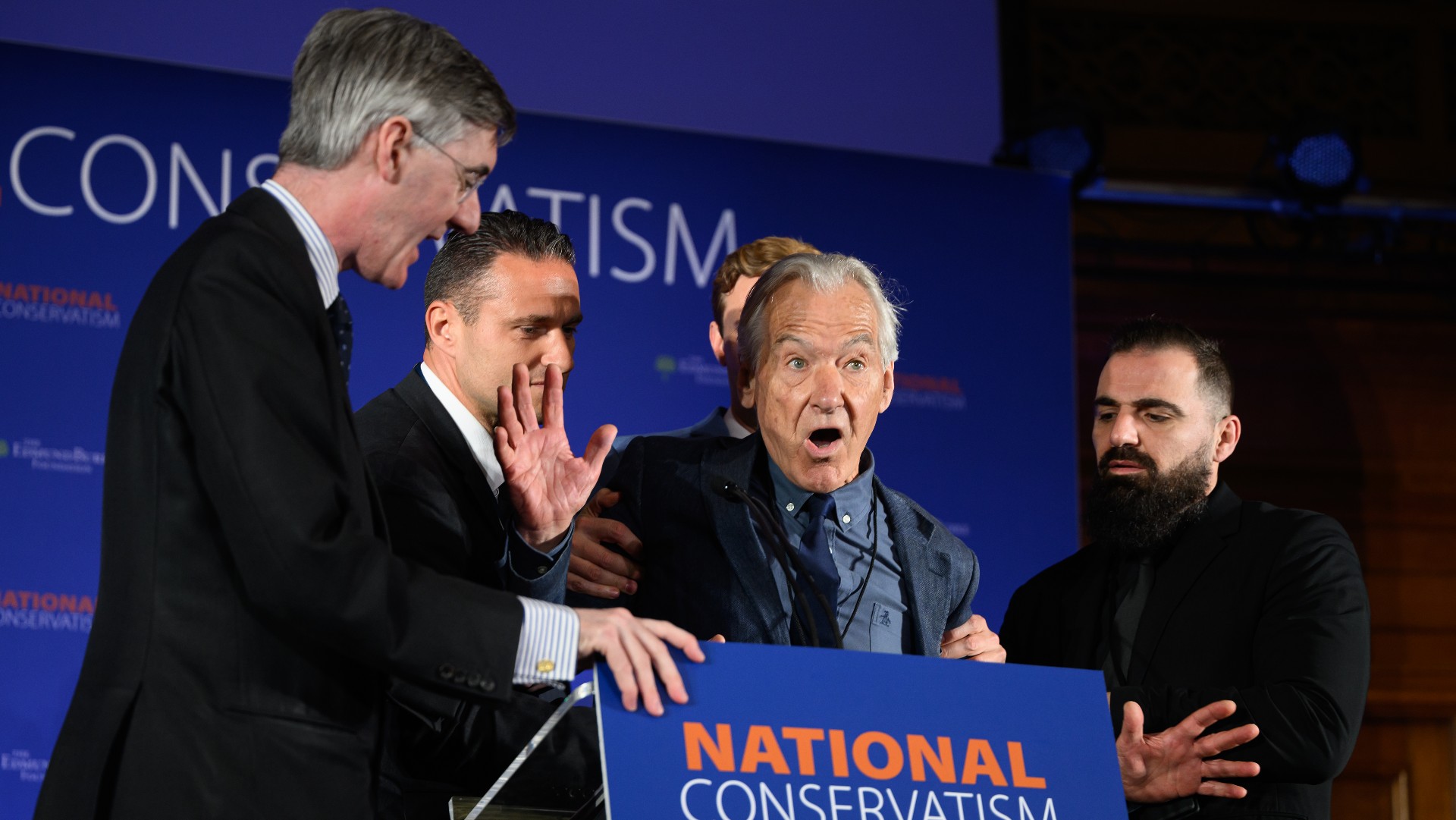National conservatism: the beliefs underpinning the first UK ‘NatCon’ conference
Movement prioritises national independence and ‘takes inspiration from Enoch Powell and Margaret Thatcher’

A free daily email with the biggest news stories of the day – and the best features from TheWeek.com
You are now subscribed
Your newsletter sign-up was successful
The first UK National Conservatism Conference was briefly disrupted this morning as a protester acting on behalf of Extinction Rebellion took to the stage during a speech by Jacob Rees-Mogg.
The three-day event at the Emmanuel Centre in Westminster, hosted by the Edmund Burke Foundation, a Washington-based think tank, brings together right-leaning public figures, journalists and academics.
Some see national conservatism as “a movement that could help shape the future of the Tory party”, a “philosophical shot in the arm for post-Brexit, family-oriented conservatism”, said Peter Walker, deputy political editor at The Guardian. Others fear its focus on “defiantly traditional social values could be an electoral cul-de-sac for a party already struggling to engage with a younger, increasingly liberal-minded UK”.
The Week
Escape your echo chamber. Get the facts behind the news, plus analysis from multiple perspectives.

Sign up for The Week's Free Newsletters
From our morning news briefing to a weekly Good News Newsletter, get the best of The Week delivered directly to your inbox.
From our morning news briefing to a weekly Good News Newsletter, get the best of The Week delivered directly to your inbox.
What do national conservatives stand for?
In a joint article for The Telegraph last month, Rees-Mogg and the former UK chief Brexit negotiator David Frost said that “at its heart” the movement “is a belief in the nation state and the principle of national independence”.
The state must “end mass migration so that all may integrate into our nation; maintain law, order and justice; support those who need help, not those who don’t; protect our institutions; and build effective armed forces in a dangerous world”, they said.
The event’s website echoes that it brings together those “who understand that the past and future of conservatism are inextricably tied to the idea of the nation, to the principle of national independence, and to the revival of the unique national traditions”.
Claiming the “democratic world” is “confronted by a rising China abroad and a powerful new Marxism at home”, it says its “rich tradition of national conservative thought” is “intellectually serious”.
A free daily email with the biggest news stories of the day – and the best features from TheWeek.com
Andrew Gamble described NatCon in The New Statesman as “a new project for restoring the political hegemony of the Conservative Party in a way that [Margaret] Thatcher might have understood”.
“Taking their inspiration from Enoch Powell, Keith Joseph, Thatcher and [Liz] Truss, they answer the question about Conservatism’s future in a very different way to those on the centre-right,” he wrote, by putting “the nation-state, its sovereignty and independence, at the heart of Conservative politics”.
Who else will speak at the conference?
Speakers include Tory MPs Michael Gove, Lee Anderson and Suella Braverman; commentators Douglas Murray, Melanie Phillips and David Starkey; Trump-endorsed Republican senator JD Vance; and Catholic priest Father Benedict Kiely.
It is a “striking line-up, considering demagogues such as Viktor Orban, the Hungarian prime minister, and Josh Hawley, the senator for Missouri, have spoken at equivalent meetings in Rome and Miami”, said Ryan Bourne in The Times.
The movement “is doing more to police its Rightward borders”, said Peter Franklin at UnHerd. But there might be another reason why Gove and his fellow Conservative MPs are willing to participate: “they’re going to be called extremists anyway”, particularly on plans to limit illegal immigration.
Home Secretary Braverman will insist today that “it’s not xenophobic to say that mass and rapid migration is unsustainable” as she delivers her keynote speech.
Indeed, the unnamed “stage invader” during Rees-Mogg’s address said he wanted to draw the audience’s attention to “a few characteristics of fascism”, said The Telegraph. The former business secretary replied that he valued free speech and that the activist could “have his national loony convention next week and see how many people show up”.
What does it mean for the Tory party?
The conference is potentially uncomfortable for Rishi Sunak as he tries to maintain his authority in the face of poor local election results and disquiet over his abandonment of a “bonfire” of EU laws.
“Unfortunately for the Prime Minister, his MPs have plenty of views on how he should govern,” wrote Katy Balls, political editor of The Spectator. As a result the conference will see “various colleagues” of the prime minister “waxing lyrical on the future of conservatism”.
“The ideas they float are likely to offer a preview of the sort of leadership challenge that could be offered by the likes of Braverman in a post-Rishi Sunak era,” added Walker in The Guardian.
If national conservatism is about “turning your back on hyper-globalisation, liberalism, the world run by the big banks and the big financial institutions and George Soros”, said Andrew Marr in a video for The New Statesman, “then isn’t Rishi Sunak more or less an embodiment of everything they’re going to try and turn their back on?”
Chas Newkey-Burden has been part of The Week Digital team for more than a decade and a journalist for 25 years, starting out on the irreverent football weekly 90 Minutes, before moving to lifestyle magazines Loaded and Attitude. He was a columnist for The Big Issue and landed a world exclusive with David Beckham that became the weekly magazine’s bestselling issue. He now writes regularly for The Guardian, The Telegraph, The Independent, Metro, FourFourTwo and the i new site. He is also the author of a number of non-fiction books.